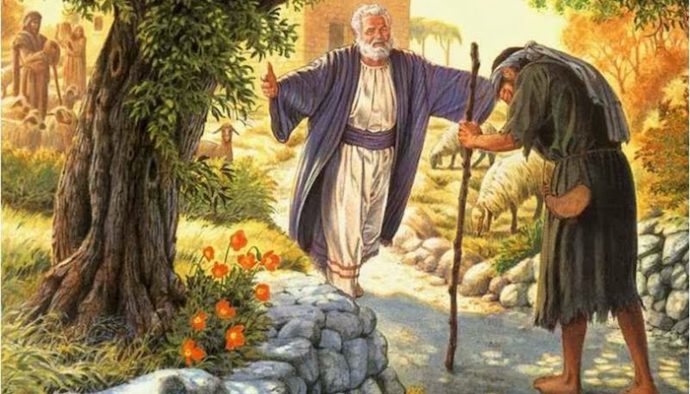In Luke 15, Jesus told a series of stories about things that are lost. A lost coin. A lost sheep. And then, maybe the most familiar and loved story that Jesus ever told in Scripture, two lost sons. It’s a story that has become known as “The Prodigal Son” in most circles, and it’s probably one you’ve heard before.
The son in question was probably in his late teens since he was still single, and he found himself in maybe the same situation that many of us have discovered during our first weeks at college. Freedom came like a rushing wind, and there was the desire inside of him to test his limits. He looked around at his life, his gullible father, all the responsibility and decided that there was much more to the world for him to know. So he went to his dad and makes a simple but a graphic request. Literally, he asked his father to give him his share of your life. The intention is clear – he wanted to sever his relationship with his old life and his family, for he in effect said to his father: “Treat me as if you were dead.”
At first, things seem to have gone as expected. He lived his life. He experienced what he wanted. But things went south from there. The text tells us that this young man “squandered” his inheritance, a verb which means to scatter or disperse. The word picture is of tossing ones’ possessions to the wind and watching it blow away with nothing coming back in return.
To make matters worse, there was a severe famine and the son entered into poverty. At the end of his resources, he took a job, but the only one to be found is dishonorable and demeaning for a Jewish person. He went to work for a Gentile, and if that weren’t bad enough, his main responsibility is was to supervise the pigs, an unclean animal. Surely Jesus’ audience could not have conceived a bigger fall. So life went on until one day, in a moment of clarity, this young man realized something. Literally, he “came to himself.”
He realized that the irony he was sitting in was even deeper than the mud and the slop. Even the people who were the hired hands of his father had enough to eat. They were better off than he was, so he formulated a plan. He would return home, not presuming to be welcomed as a son, but only to be treated as a daily laborer. This was a class of person that was only hired on special occasions and only for one day at a time. So he begins the trek back to his father’s house.
If we could peek inside the mind of the son during that walk, we might see him rehearsing over and over again the words he would say to his father. He wanted the apology to be just right, not too long, but saying everything he had thought of in the past days. He wanted to express exactly how foolish he had been and to convince his father of how much better of a son he would be in the future. The tension built as he started to pass familiar landmarks, and all the way he repeated the words to himself. One step at a time, his head hung lower and lower in shame and self doubt. And then he got within sight of the house.
What happened next maybe the most shocking of all. We see the son’s head bowed low, his clothes tattered and dirty; he had tried his best on the road to get the mud off of him but he still bore the distinct smell of pig manure. And as he looked up, he saw an old man running. Running! To run was to break protocol; it was undignified. No self-respecting Jewish property owner would run, and yet here was his father. He barely had time to gather himself together because soon his father was standing face to face with him. He began to stutter out the words he had so carefully planned, but before he can even get the full apology out, the father literally fell upon his neck in an embrace. His words turned to sobs, but his sobs were outshone by his father’s sobs – not of disappointment, not of anger, but of joy. Then the party begins.
Yes, it’s a familiar story. But this familiar story teaches us at least two glorious truths about repentance:
1. Wandering does not change our status.
The son thought it did. Technically, he knew he was still his father’s son, but he did not hold out any hope for being treated as such. That ship had sailed. He only wanted a place to sleep and food to eat, and yet his father would hear nothing of the sort. The animal was slaughtered; the ring was placed on his finger; the robe was draped over his shoulders. Why?
It’s because this son, though he wandered, was and always would be the father’s son.
Our lives are spent in the pattern of repentance. We are, indeed, prone to wander – Lord we feel it! We are prone to leave the God we love. We do, in big and small ways, and then we turn back. We come to ourselves and realize our foolishness. We return, and amazingly, we find that we have not been disowned. We have not been forsaken. We are, still, the sons and daughters of our father. So, friend, do not entertain the thought that at one point you will repent and the Lord will have had enough. He has not. He will receive you – and me – again, not as day laborers, but as His beloved children.
2. Repentance is safe with God.
Oh, the son had his apology practiced. He had plenty of time to rehearse it. He anticipated that in coming back, he would at the very least be accepted in on a probationary level. But maybe – just maybe – after some time, he could earn his way back into his father’s good graces.
But this father did not even let the words get out of his son’s mouth before he fell upon his neck and was crushing him with kindness. The son had turned, and the father met him on the road. He did not wait to see if the son would climb all the way up to the hill, but instead, ran to meet him where he was.
Our repentance is gloriously safe with God. We will, when we turn, not meet a God who is putting us on spiritual probation. We will not meet a father who will constantly bring up our past failings. We will not encounter a God who demands some kind of repayment for all we have squandered. Nothing like that. Only kindness. Grace. Love. Acceptance.
For this is the nature of the gospel – the gospel that not only brings us into the Father’s house once, but once that welcomes us over and over again.
Subscribe to MichaelKelley.co
Never miss a new post. Subscribe to receive these posts in your inbox and to receive information about new discipleship resources.





